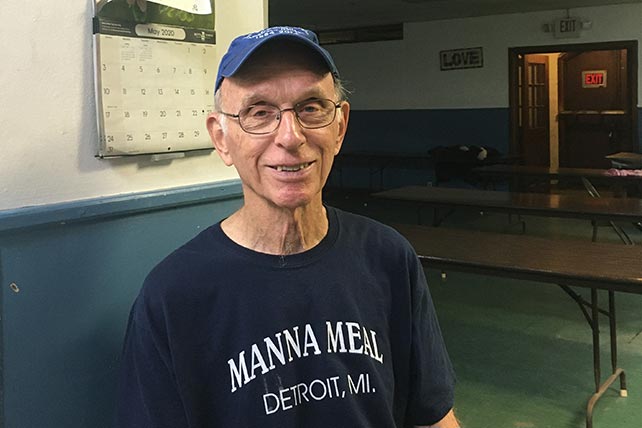Maybe (Maybe!) the post-COVID world is finally coming into view. While different countries, regions, provinces and states will emerge out of COVID at different times, 2021 appears to be the year we will be able to move into a post-COVID world.
So, as we get ready to embrace the new reality, what should we focus on?
It’s obviously a tough question to answer because neither in-person church or online church is a panacea. Each has its unique challenges, promises and limits. In-person church attendance has been declining for decades before the pandemic, and online church hasn’t solved all the issues the church is facing either.
That said, here are some guidelines that can help moving forward.
Here are 5 critical mistakes it would be so easy to make right now as a church leader.
1. Taking Your Foot Off The Digital Gas Pedal
There will be a real temptation to once the world moves past COVID to think of digital ministry as an afterthought or something that’s no longer necessary.
You’re certainly free to make that decision, but in many ways that would be a mistake.
Barna research shows that 7 in 10 churched adults agree that, post-COVID, churches should use digital resources to reach and engage their neighborhoods. In addition, 21% of US unchurched adults are open to watching an online service alone. For those unchurched adults with a high digital openness though, that percentage climbs to 87%.
While in-person church is here to stay, to back off on digital now is to back off on the future and to back off on outreach. If you care about reaching people, that’s a mistake.
Hybrid church (churches offering great in-person experiences and digital experiences) will be the future because everyone has lived a hybrid life for years. One moment you’re on social media, the next you’re having coffee with a friend in real life. .
If you want more on the interplay of physical and digital church in the future, including how your online presence serves as both a front door and side door, I wrote more here.
Treating digital as something interesting or nice to have may have been an acceptable strategy in 2011. But this is 2021.
2. Allocating Most Of Your Staff And Volunteers To Ministry In The Church Building
Not much has changed since I wrote this post last year arguing that too many church leaders will step into the past as they step back into their buildings. The same dynamics are very much in play right now.
While it’s true that most churches feel short-staffed and under-resourced, the pre-COVID habit of assigning your online ministry as one line in a job description to your tech person or creative person is history. Or at least if you want a future it’s history.
As distributed gatherings, micro-gatherings and online ministry continues to grow, dedicating a meaningful percentage of your staff, budget, and volunteers to ministry that happens outside the church building is critical.
How much of your resources should be allocated to online and distributed gatherings?
I talked to one leader who said that post-COVID, 40% of his team, time and energy will go into online.
I think that’s a healthy percentage.
While that might seem like a complete stretch for most churches, gradually increasing the resources you devote to online and off-building ministry is possible for everyone.
Don’t have staff or feel understaffed?
Look for 15-25 year old volunteers to help you with your online presence. They see the future because they are the future. And the present.
3. Resuming In-Person Services Exactly As They Were Pre-COVID
The jury is still very much out on what’s going to happen to services once the world is re-opened.
But many church leaders are considering running two kinds of services: in-person and then a separate one devoted to online.
In other words, online will become something other than just a live-stream of whatever is happening in the auditorium or sanctuary on Sunday.
While this presents challenges from both a time and resource standpoint, this approach makes sense for a few reasons.
First, almost every church leader has come to realize that online services are best when they’re shorter.
Second, nobody has really figured out what to do with worship music online. The four or five song set that works in church just doesn’t translate online.
Third, preaching to a crowd is great, but it feels less personal when you’re watching on a device. Direct-to-camera preaching (including different camera positions and even the use of DSLRs) can make the online experience much better.
More than a few pastors I talk to are shooting an online version of their message and service mid-week for broadcast on Sunday and for access on-demand, but then doing a different experience in the room live on Sunday that doesn’t get streamed. By different, it could be the same message, just delivered live (or via video), but more music and other elements that may not translate as well online.
This IS a lot of work. I get it.
If you don’t have the resources for it, at least consider doing something different online that’s direct to camera…something like a 5 minute devotion, talk or something other than just the stream of your Sunday morning in-person gatherings.
I have a full training session and application guide on how to create great online content inside The Leader’s Circle. You can get instant access to a free trial of The Leader’s Circle on-demand training for you and your team here.
Finally, when it comes to your in-person gatherings, make the experience more…personal.
Many re-opened churches that are seeing some traction are making the in-person experience different than online by offering food, coffee, parking lot or side room gatherings for people to connect. And they’re providing kids experiences that provide something other than a carbon copy of what you can get online.
The principle here is clear: if everything your church does in the future feels downloadable, probably all you’ll get is a lot of downloads, not a lot of gathered people. (For more on that, read this.)
4. Posting Every Thought You Have On Every Issue Online
Let’s switch gears for a minute and talk less about how and more about what.
This deserves a post of its own, but it’s becoming clear that one of the reasons people who don’t go to church don’t want to go to church is simple: your social media posts.
According to a recent Barna survey, only 30% of non-Christians have a positive reaction when they see people post things about their Christian faith on social media. (45% don’t have a positive reaction, and 25% indicated they don’t know.)
I am increasingly concerned about the number of church leaders who feel the compulsion to post their opinion online about everything. From negative rants or arguments on vaccines to politics, to legislation, to climate change, to some grievance against a neighbor or celebrity, whatever else they happen to have an opinion on in the moment, the daily tirade I see on my social feed is exhausting.
You know the world is watching and listening right?
Even if you’re posting from your personal account, you’re leaving an impression on the unchurched who follow you.
Influence takes years to build and seconds to lose. Church, we’re losing a lot of influence right now.
5. Resenting People Who Aren’t Doing What You Want Them To Do
One truth you’ve consistently faced as a leader is this: people rarely do exactly what you want them to do.
That’s going to get more intense in the post-pandemic era.
People won’t follow the patterns you want them to follow. Maybe people will come back in droves. Maybe they won’t. The early evidence hasn’t been encouraging.
The question is this:
How do you interact with infrequent church attenders who don’t seem to be embracing the mission of your church the way?
I think it’s simple.
You embrace them anyway.
I chose the word ’embrace’ on purpose. Because I know there’s something deep-seated in many of us that wants to reject people if we sense they’re rejecting us. And people who don’t come out to church much on Sunday can feel like rejection if you’re an insecure church leader.
Grow up. Be more secure.
Rather than judging them, why not love them? Judgment is a terrible evangelism study. You run from people who resent and judge you. Why should you expect any different from the people you lead?
Ultimately, people gravitate to where they are valued most. So value people.
I’d guess that you know how important team training and development is… but doesn’t it always seem like a scramble to get everything lined up for staff meeting?
You know the drill… every time you have a staff or volunteer training time scheduled, you have to read a book, listen to a podcast, or even go to a conference.
That’s why I’m so excited to introduce The Leader’s Circle to you.
It eliminates the hassle of staff training with carefully curated content that builds essential leadership skills into your team. Every. Single. Month.
What Do You See?
Those are some potential mistakes I see on the horizon.
This article on a Post-COVID world originally appeared here.















